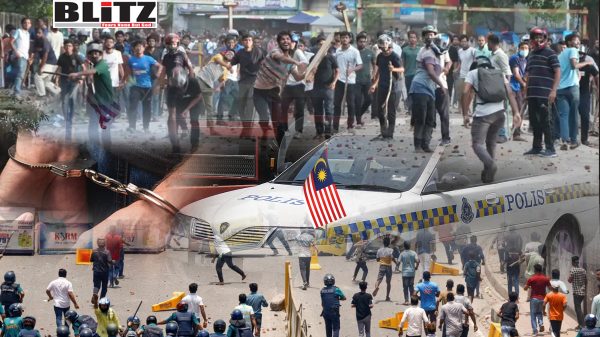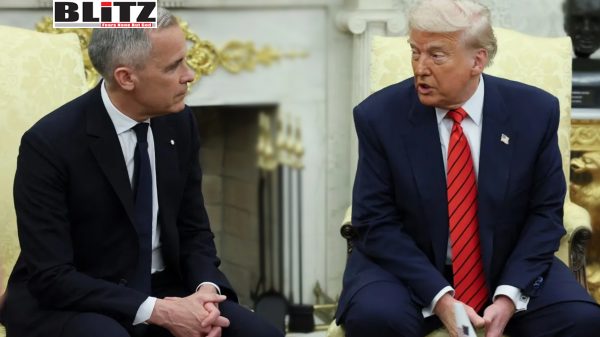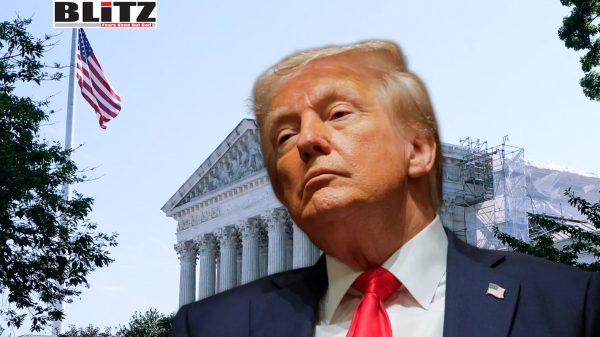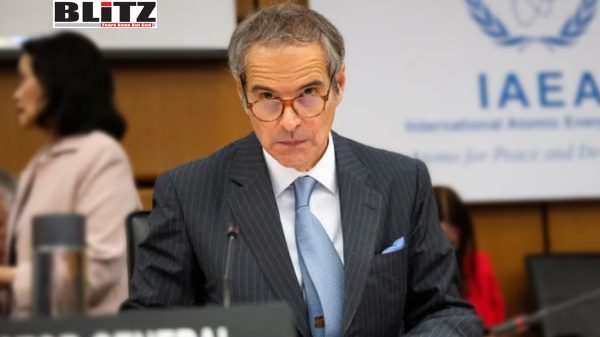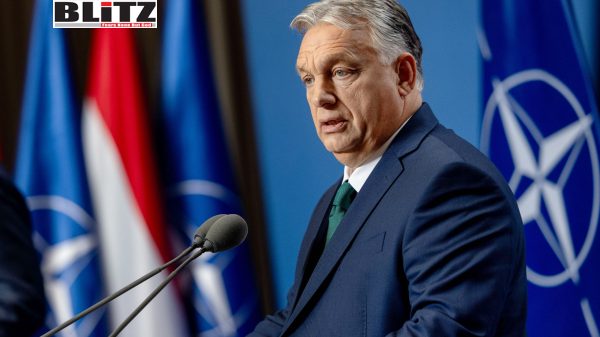Fake election observer Mawlana Abed Ali threatens Blitz editor
- Update Time : Wednesday, November 15, 2023

Blitz, known for its investigative journalism and counter-terrorism reporting for more than two decades, has established itself as a vocal newspaper in the entire world, particularly in exposing militancy groups, hate-preachers, terror-funders and elements that pose threats to peace and security. Among its impactful reports was an exposé on Mawlana Abed Ali. On November 14, 2023, Mawlana Abed Ali threatened Blitz Editor Salah Uddin Shoaib Choudhury, in response to the newspaper’s authentic and fact-based investigative stories. These stories had brought to light Mawlana Abed Ali’s fraudulent venture involving fake election observers.
The tension between Mawlana Abed Ali and Blitz escalated following the publication of a detailed investigation of Mawlana Abed Ali and his election observers drama by the newspaper, which unveiled Abed Ali’s involvement in orchestrating a sham election observer scheme. This investigative report not only shed light on the questionable activities but also positioned Blitz as a defender of journalistic integrity and truth in the face of potential threats and intimidation. The report, which has been a subject of considerable attention, underscores the newspaper’s commitment to uncovering and reporting facts, even when faced with opposition from influential figures.
Investigative report about Mawlana Abed Ali on Blitz delves into the controversial activities of this controversial individual who holds the position of chairman of the “Election Monitoring Forum” (EMF) and the “SAARC Human Rights Foundation” (SHRF).
Abed Ali, known for his dubious role in the 2018 general election in Bangladesh, has been criticized for bringing in fake election observers, most of whom lacked any prior experience in election monitoring. His dubious organizations, which have been accused of illegally using the SAARC emblem without authorization, have raised serious questions about their legitimacy. The use of fake identities and questionable affiliations, underscores the concerns raised by Blitz in their investigative reporting.
The threat against Salah Uddin Shoaib Choudhury by Mawlana Abed Ali is more than a personal attack; it represents a significant challenge to freedom of press, freedom of expression and even democracy in Bangladesh. Such incidents raise alarm about the safety and security of journalists who dare to confront powerful entities through their work. This confrontation is not just an isolated event but a reflection of the broader risks that journalists face when they expose corruption and malpractice.
Reports suggest that Mawlana Abed Ali is assembling a group of bogus election observers from various countries, including members from the European Union, in an attempt to influence the outcome of the upcoming general election in Bangladesh which is scheduled to take place during first week of January next year.
In response to Blitz’s exposure of these activities, Abed Ali contacted the newspaper’s editor, Salah Uddin Shoaib Choudhury, on November 14, 2023 afternoon at 01:06 pm from a mobile phone number 0167-5429586, issuing threats with language deemed too offensive for publication.
Abed Ali, who is suspected of having ties with militant and terrorist groups and has been reportedly supported by certain factions aiming to disrupt the electoral process in Bangladesh, recently managed to secure meetings with key political figures, including Bangladesh Prime Minister Sheikh Hasina and Chief Election Commissioner Kazi Habibul Awal.
His actions, which starkly oppose the principles of democracy and a fair electoral process, could potentially attract US visa restrictions. Furthermore, Abed Ali’s formation of a fraudulent election observation team, led by a known deceiver, is likely to draw international scrutiny, with calls for the Election Commission to explain its stance on this matter.

Mawlana Abed Ali attacked Salah Uddin Shoaib Choudhury on November 14, 2023 at 1:06 pm, when Ali contacted the Blitz editor via WhatsApp from a local phone number. During this call, Abed Ali unleashed a tirade of offensive language against the internationally acclaimed multi-award-willing anti-militancy journalist and editor of Blitz.
He threatened the editor with “dire consequences”, arrogantly asserting his influence by stating, “Do you know who I am? I work with the Prime Minister and other ministers. Shall teach you a good lesson. You fuc**ng journalist don’t know, my hands are very long”.
This incident not only highlights the aggressive stance taken by Mawlana Abed Ali but also raises serious concerns about the use of intimidation tactics against journalists and the potential abuse of power by individuals claiming close ties with high-ranking officials including the Prime Minister of Bangladesh.
The alarming nature of this threat has sparked a call for immediate action from both national and international bodies concerned with press freedom and the integrity of democratic processes. There is a growing demand for a thorough investigation into Abed Ali’s claims of influence and his alleged connections with high-ranking officials including the Prime Minister. The international community, along with local advocacy groups, is urged to monitor the situation closely and provide support to ensure the safety of journalists like Shoaib Choudhury.
Furthermore, this event raises questions about the accountability of those who attempt to use their purported connections and influence to suppress journalistic freedom and manipulate democratic institutions such as free and fair elections.
Individuals like Mawlana Abed Ali represent a cunning and dangerous element in society, adept at using their influence to silence dissent by any means necessary. Whenever a news story surfaces that threatens to expose their fraudulent activities, they resort to tactics of intimidation or financial inducements to quash the emerging voices of truth.
A significant aspect of Mawlana Abed Ali’s controversial activities, as highlighted in the Blitz article, involves his dubious connection with the “EU Reporter” website. Abed Ali, in his capacity as the chairman of the ‘Election Monitoring Forum’, attempted to bring in individuals under the guise of election observers for the forthcoming general election in Bangladesh. Among these individuals is Nick Powell, described as the ‘Political Editor’ of the EU Reporter, merely a website not significant in mainstream media. This scandalous move by Mawlana Abed Ali to involve foreign nationals, who lacks prior experience in election observation, in the electoral process of Bangladesh, not only exposes his intentions but also casts shadow on the integrity of the election in Bangladesh.
Blitz has played a pivotal role in exposing Abed Ali’s plans to deceive the government and the international community by portraying these unqualified individuals as legitimate observers. This exposure by Blitz has been crucial in preventing Abed Ali from repeating his controversial methods to manipulate the election process, thereby safeguarding the integrity of the upcoming elections.
The Eastern Herald’s report titled “Dhaka Gate: Allegations of Election Manipulation by Bangladesh Minister Shahriar Alam” unveils further layers to Mawlana Abed Ali’s intricate web of deceit. The report details a scandalous plot, involving Bangladesh’s Junior Minister for Foreign Affairs, Shahriar Alam, and Nick Powell of the “EU Reporter”. This plot, known as ‘Dhaka Gate’, revolves around manipulating the upcoming general elections in Bangladesh. According to The Eastern Herald, Powell, who self-identifies as an “international election observer”, was allegedly offered a substantial sum to ensure a skewed election. Mawlana Abed Ali has a history of fraudulent activities, as he continues to employ similar controversial methods to deceive the government and manipulate the electoral process.
Mawlana Abed Ali’s actions and intentions align closely with the type of behavior targeted by the new US Visa Restriction policy. This policy, designed to curb human rights violations and electoral manipulation, seems tailor-made for individuals like Abed Ali. His attempts to manipulate elections and the electoral process in Bangladesh, coupled with his efforts to influence media and press freedom, exemplify the very concerns this policy seeks to address. Abed Ali’s history of threatening journalists, as evidenced by his recent confrontation with Blitz editor Salah Uddin Shoaib Choudhury, further underscores his disregard for journalistic integrity and democratic principles. His actions not only threaten the sanctity of the electoral process but also pose a significant challenge to the freedom of the press. In this context, Abed Ali represents a clear example of the kind of individual the US Visa Restriction policy aims to hold accountable, highlighting the need for international vigilance against such undemocratic practices.
Bangladesh authorities need to immediate initiate an investigation into the case of Mawlana Abed Ali and also find those who are involved in getting his fraudulent organizations enrolled as election observers with the Election Commission in Bangladesh. Furthermore, authorities also need to investigate how a proven fraud has succeeded in meeting Bangladesh Prime Minister Sheikh Hasina and later circulate photographs of such meetings on social media possibly with the ulterior motives. Unless Bangladesh Election Commission, particularly the Chief Election Commissioner Habibul Awal can come up with an acceptable clarification of how his office has entrusted two dubious organizations run by Mawlana Abed Ali to monitor the upcoming general election scheduled to be held in January 2024, it can result in doubts.


